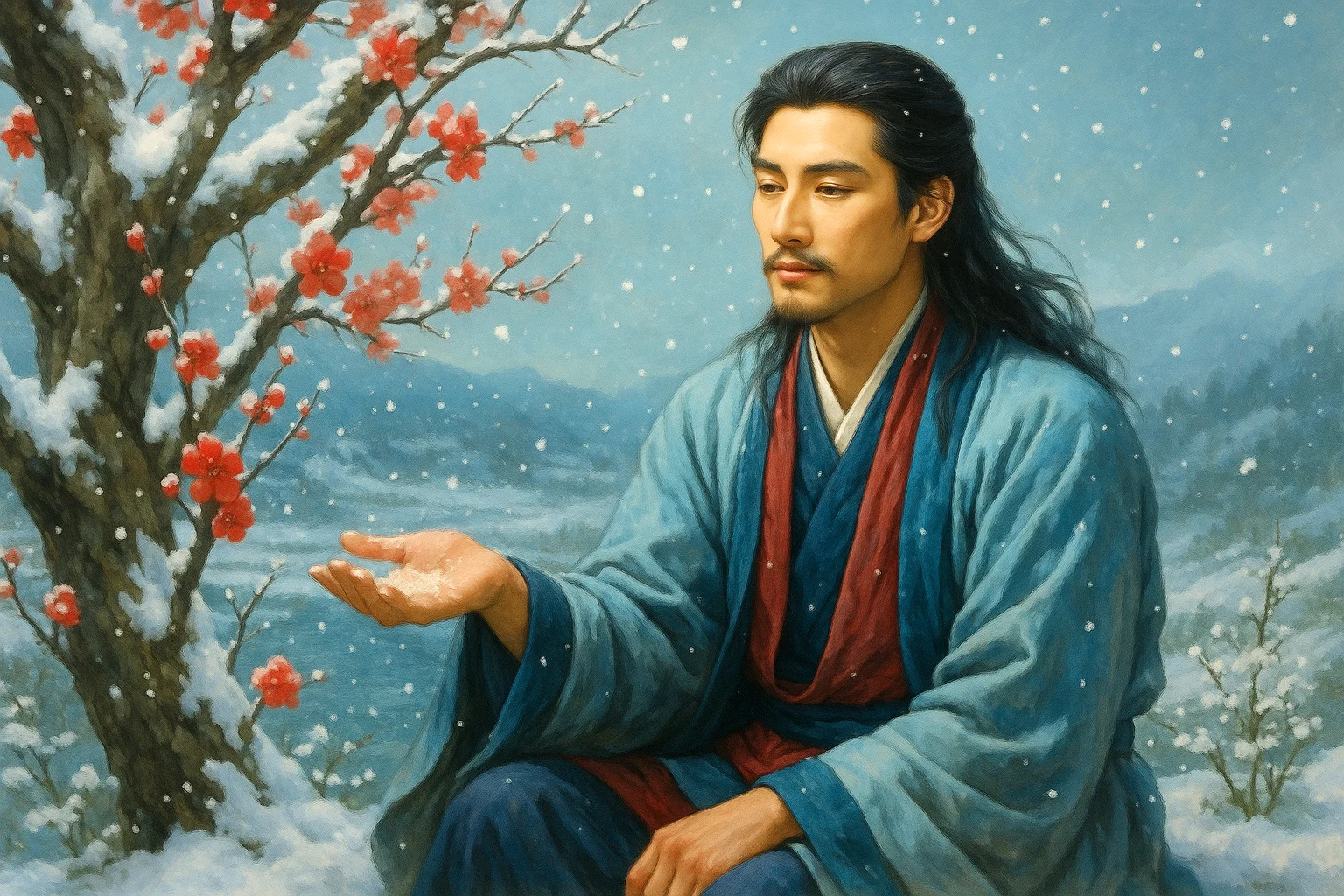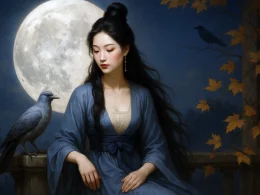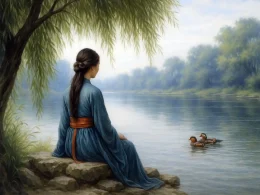The icy wind sweeps the railings, snow falls without end;
Melancholy—no one holds the fishing rod.
Now and then an official boat passes the bridge—
White gulls take flight, alighting on the sandbank ahead.
Original Poem
「钓雪亭」
姜夔
阑干风冷雪漫漫,惆怅无人把钓竿。
时有官船桥畔过,白鸥飞去落前滩。
Interpretation
Composed during the Southern Song Dynasty while Jiang Kui was traveling in Hefei—a place entwined not only with his wanderings but also with a profound romantic past. Here, the poet shared a deep bond with a courtesan, their time together becoming an indelible dream that lingered throughout his life. Beauty faded, love remained unfulfilled, and after their parting, no word came again. Only the remnants of snow at the river pavilion and the distant silhouettes of gulls stirred the sorrow buried in his heart. This poem is an elegy for those bygone days, a vessel for his tender yet desolate emotions.
First Couplet: "阑干风冷雪漫漫,惆怅无人把钓竿。"
Lán gān fēng lěng xuě màn màn, chóu chàng wú rén bǎ diào gān.
By the railings, the wind bites cold, snow drifts without end;
Melancholy—no one holds the fishing rod, no friend.
Scene and emotion intertwine from the outset, enveloping the poem in icy solitude. The "Snow-Covered Fishing Pavilion" stands empty, its present desolation sharply contrasting with past gatherings, deepening the poet's sorrow through this emotional落差.
Second Couplet: "时有官船桥畔过,白鸥飞去落前滩。"
Shí yǒu guān chuán qiáo pàn guò, bái ōu fēi qù luò qián tān.
Now and then an official boat passes the bridge side,
Startling white gulls into flight, then to the forebeach they glide.
These lines introduce subtle movement into the quiet snowscape. The indifferent "official boat" and the aimless "white gulls" mirror the poet's inner loneliness and the rootlessness of life. Memories, like the gulls, are startled into flight only to settle again—unable to stay, yet impossible to forget.
Holistic Appreciation
Set against a desolate snowy landscape, this poem conveys the sorrow of lost love and the ache of nostalgia. The poet gazes into the distance from a railing, where wind and snow merge into a boundless expanse—all is silent, and he stands alone, his heart as cold and desolate as the wintry scene. The "fishing rod," once a symbol of leisurely delight, now lies untouched, embodying the irretrievable past and the fading of joy. The latter couplet depicts an official boat passing by, startling the gulls into flight—a fleeting moment of movement amid stillness, where scenery and emotion intertwine. The gulls, taking flight only to land again, mirror the ebb and flow of memory—old dreams like smoke, love severed like snow. This is no mere lament of a disheartened soul; rather, it immerses emotion into nature, using stillness to convey motion and scenery to express feeling. Ethereal yet mournful, it captures the essence of Jiang Kui’s lyricism in his nature poetry and object-inspired verse.
Artistic Merits
- Emotion Projected onto Scenery, Blending Feeling and Image: The poet employs snow, wind, gulls, and boats to convey solitude and melancholy—emotion unspoken yet pervasive.
- Minimalist Composition, Profound Sentiment: In just four lines, the poem subtly expresses deep longing and endless grief for a bygone romance, leaving poignant space for reflection.
- Dreams Hidden in Verse, Pain Within Dreams: Though never explicitly mentioned, the entire poem feels like a dreamscape revisited—haunted by loss, regret, and the weight of memory.
Insights
This poem reveals that the most profound emotions are often not expressed through intensity but linger in the fall of snow and the bite of wind, embedded in scenes and details. Many of life’s partings and losses are not earth-shattering but quiet, yet they seep into the bones like winter’s chill. By channeling human sorrow through nature’s imagery, the poet also offers a lesson: though longing may be beautiful, without a destination, it becomes a burden. Those who love deeply must learn composure—lest they be ensnared by illusions.
About the poet

Jiang Kui (姜夔, c. 1155 - 1221), a native of Poyang, Jiangxi, was a Southern Song Dynasty lyric poet and musician. He remained a commoner throughout his life. His lyrics are known for their ethereal and austere style, and his poetry is also highly regarded. Along with Fan Chengda and Yang Wanli, he is celebrated as one of the "Four Great Masters of the Restoration."












